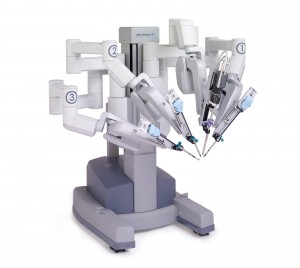Is Robotic Prostatectomy Surgery All It’s Cracked Up to Be?
Jan 10th, 2012 | By admin | Category: Featured Most cases of prostate cancer are usually given the option of radioactive therapy or surgery. When choosing surgery, there’s the option of either conventional open surgery (a large incision), laparoscopic surgery (less invasive, with smaller incisions and cameras), or robotically-assisted laparoscopic surgery.
Most cases of prostate cancer are usually given the option of radioactive therapy or surgery. When choosing surgery, there’s the option of either conventional open surgery (a large incision), laparoscopic surgery (less invasive, with smaller incisions and cameras), or robotically-assisted laparoscopic surgery.
There are amazing benefits to robotic prostatectomy. The incisions are much smaller, so healing time is faster and length of stay is minimized. There tend to be fewer complications after the procedures and the success rate is at least as good as open/laoaroscopic surgery, if not better.
However, two more (important) claims made about the benefits of robotic prostatectomy have undergone scrutiny recently. The first is urinary function, and the second is sexual function, both major concerns by men who have had prostate surgery.
A recent study done this week that surveyed men who had prostate surgery of some kind between August 2008 and December 2008 compiled results on this very subject, to compare the results over time for those who had either robotic or open surgery.
Completed surveys were collected from 685 men who had either had robotic or open prostatectomy. The study concluded that the risks of problems with both urinary function and erectile function are high after both of the procedures.
So does this survey demonstrate that robotic prostate surgery a lot of over-marketed hype? I don’t think so. If the robotic-assisted procedure is less invasive, heals faster, and is at least as good as the other forms of radical prostatectomy at recovery for both urinary and sexual health, it seems to me it is the superior option. However, the claim of superior recovery for urinary and sexual health are claims made by the proponents of robotic prostatectomy.
As a patient, an individual needs to discuss the options with their doctor to make the decision about what would be best to them for their particular condition. And while that decision may be robotic prosatectomy, as it stands it should be made with the consideration that improvement of urinary/sexual function over more traditional surgery methods may not be all they’re said to be.
An Abstract of this Study, published online Jan 3, 2012: http://jco.ascopubs.org/content/early/2012/01/03/JCO.2011.36.8621.abstract?sid=aad92c9d-7bb3-49ed-be5f-645917c7b9fb

